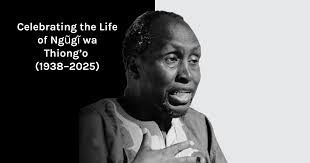Reconsidering Ngũgĩ in Contemporary Africa: Urban Vernaculars and the Linguistic Agency in Youth Cultures
- Vick Ssali
- Jul 2, 2025
- 3 min read
A Workshop at Sophia University Friday, July 18, 2025

Workshop Concept Note
Background and Rationale:
Ngũgĩ wa Thiong’o’s intellectual legacy, especially his radical call in Decolonising the Mind to reject colonial languages and write in African indigenous languages, has deeply shaped debates in African literary, cultural, and political thought. Yet, in contemporary urban Africa, linguistic realities among the youth present a challenge—and perhaps a necessary rethinking—of the applicability of this vision. In multilingual urban contexts such as Nairobi, young people are forging new linguistic codes—like Sheng —that combine indigenous languages, colonial languages, and global media lexicons into fluid, dynamic forms of communication. These so-called “urban youth languages” emerge not only from ethnolinguistic diversity but from the need to articulate new socio-economic identities, resist hegemonic norms, and claim expressive agency in rapidly shifting urban environments. Sheng in Kenya, for example, functions simultaneously as a language of survival, solidarity, exclusion, protest, satire, and creativity. It is at once a product of inequality and a vernacular tool for reclaiming voice.
This workshop seeks to dialogue with the intellectual legacy of Ngũgĩ wa Thiong’o through the lens of contemporary African youth cultures and the emergence of urban vernaculars such as Sheng. Ngũgĩ’s call to embrace indigenous African languages as part of the larger project of decolonisation remains one of the most powerful and controversial intellectual provocations of our time. Yet the linguistic realities of urban Africa—shaped by migration, inequality, globalisation, and digital media—demand a rethinking of what decolonising language might mean in practice today. While Ngũgĩ advocated for a return to indigenous languages such as Gĩkũyũ in literature and education, urban youth are generating hybrid languages that blur the lines between the colonial and the indigenous, complicating binaries that Ngũgĩ’s framework presumes.
This workshop invites critical reflections on how Ngũgĩ’s linguistic ideals intersect, collide, or converge with emerging linguistic trends among African youth. What is the place of Sheng and other urban vernaculars in the broader conversation on decolonisation? Can the rise of digital and popular media in indigenous and hybrid languages be seen as a realisation of Ngũgĩ’s vision, or does it mark a departure from it? How do class, marginality, and technological access influence these linguistic developments? And what forms of political or cultural agency do they enable?
By bringing together scholars and students, this workshop aims to open a multi-vocal conversation on the possibilities and limits of linguistic decolonisation in an era of fluid identities and urban transformation. Ultimately, this event hopes to honour Ngũgĩ not only by revisiting his provocations but also by confronting their contradictions, testing their relevance, and imagining more inclusive futures for African cultural expression.
This phenomenon raises a timely and necessary set of questions:
What is the place of Ngũgĩ’s linguistic purism in light of the linguistic improvisation and hybridity shaping youth culture today?
Does the rise of such languages signify a betrayal of decolonisation—or might it represent a different form of it, rooted in lived experience rather than ideological purity?
Can we reframe Ngũgĩ’s vision to accommodate evolving sociolinguistic practices while still honouring his insistence on African agency?
What role does digital media, pop culture, and mainstream platforms (radio, TV, vlogging, etc.) play in normalizing and legitimizing these new codes?
Objectives of the Workshop:
To critically re-evaluate Ngũgĩ wa Thiong’o’s linguistic thesis in light of emerging urban linguistic practices in Africa.
To examine the social, economic, and political contexts that shape the creation and spread of urban youth languages.
To engage interdisciplinary perspectives from sociolinguistics, African studies, and urban youth cultures.
To foster dialogue on how language functions as both a site of identity and resistance in postcolonial African cities.
To explore the implications of these linguistic trends for pedagogy, cultural policy, and African literary production.
Target Audience:The workshop invites participation from scholars, students, writers, educators, cultural workers, digital content creators, and media practitioners across disciplines and geographies. It particularly welcomes those engaged with language politics, urban youth cultures, decolonisation studies, and African expressive forms.
Proposed Speakers & Moderators:
Prof. John M. Mugane, Professor of the Practice of African Languages and Cultures and Director of the African Language Program, Havard University
Dr. Kithinji Kinyua, Research Fellow, African Studies Center, Tokyo University of Foreign Studies
Prof. Wakiko Ohira, Center for Global Discovery, Sophia University
Host:
Institute of Asian, African, and Middle Eastern Studies – Sophia University
Supported by:
Japan Society for Afrasian Studies
African Studies Center – Tokyo University of Foreign Studies
Proposed Venue:
Sophia University – Yotsuya Campus, Building 2, Room 6:203 & On Zoom
Proposed Dates:
July 18th 2025
Check the details here below.




Comments